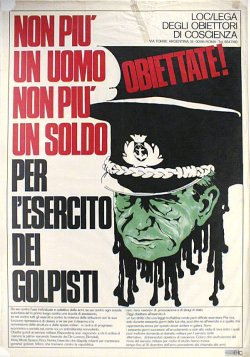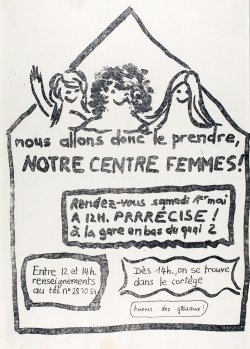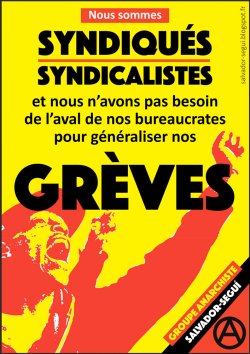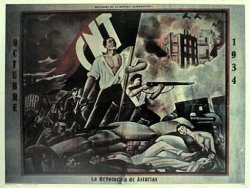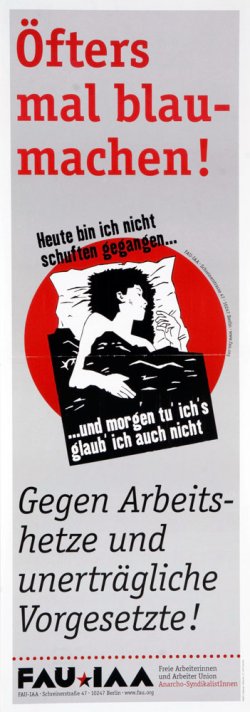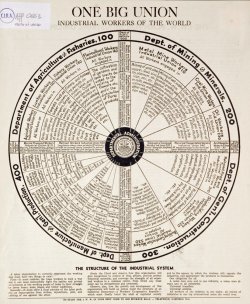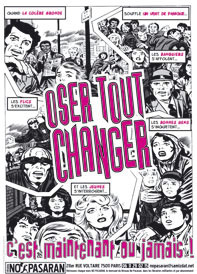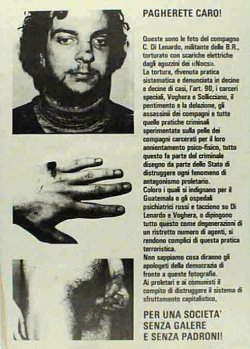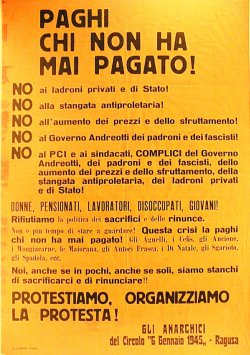[s.d.]
[sans date]
764 affiches :
- notice : Image (fixe ; à 2 dimensions)
- notes :
- descriptif :
[ Texte en carré sur drapeau taillé rouge et noir ]
- texte :
No votes
El comité es de la empresa, el sindicato del trabajador
¡Organizate !
CNT - AIT
- notice : Image (fixe ; à 2 dimensions)
- notes :
- descriptif :
[ titre ; montage photo (pape Jean-Paul II et pénis volant) ]
- texte :
Noi ce l’abbiamo lungo
El faso occupato
- notice : Image (fixe ; à 2 dimensions)
- notes :
- descriptif :
[ texte (manuscrit) sur fond de dessin de mur de brique ]
- texte :
Non à l’expulsion des réfugiés politiques espagnols
Exigeons pour tour
• la possibilité d’habiter dans les départements de leurs choix
* le droit d’expression politique— CNT —
— FA ----
[… impr. ?]
Vers 1976 (lors de la visite du roi d’Espagne) ?
- notice : Image (fixe ; à 2 dimensions)
- notes :
- descriptif :
[ texte ; dessin (sigle nucléaire) ]
- texte :
Non à l’industrie nucléaire
danger radioactivité
ni bombe, ni centrale
Luttons pour
Le désarmement atomique et total, la reconversion et la décentralisation des sources d’énergie
Fédération Anarchiste - 3, rue Ternaux (11e)
[… impr. ?]
- notice : Image (fixe ; à 2 dimensions)
- notes :
- descriptif :
[ texte ; photo solarisée (manifestants jetant des cocktails molotov) ]
- texte :
À l’ombre d’une prison, personne ne peut être libre
Non à la maxi-prison
Soyons incontrôlables !
- notice : Image (fixe ; à 2 dimensions)
- notes :
- descriptif :
[ texte ; dessin (homme qui hurle avec deux marionnettes femmes — une femme blonde (féministe ?) et une femme brune tête couverte (musulmane ?) — qui se disputent au bout de ses bras levés ; village — avec grue de chantier — barricadé de barbelés ; famille à la porte d’entrée accueillant sous le panneau « Bienvenue en France » ; frise de manifestant·e·s bombardant l’homme aux marionnettes) ]
- texte :
Non à la récupération raciste du féminisme
Pas besoin de chercher le sexisme ailleurs.
Y’a ce qui faut à la maison !
Nous n’aimons pas les faux débats sur “l’identité nationale”.
L’État-nation s’est construit sur l’écrasement de ses minorités dans les métropoles et l’exploitation des richesses dans les colonies.
Il a construit des hiérarchies et des catégories pour dire qui était “neutre” et reconnaître qui devait faire ses preuves et/ou en était forcément exclu-e.
L’État-nation se veut uni et homogène pour exister.
Pour ça il a besoin de désigner des ennemis qui permettent l’unité fictive du reste de la population.
L’État-nation a besoin de techniques pour construire l’identité nationale. Ça passe par le langage, le sport, les traditions inventées, l’école, l’Histoire, les lois, et tout un tas de choses qui traversent nos vies quotidiennes.Nous pensons qu’il y a urgence à ouvrir un débat sur le passé colonial et ses conséquences actuelles.
Il nous semble que les termes du débat devraient être définis par les minoritaires.des féministes contre l’islamophobie
Avant 2018
- notice : Image (fixe ; à 2 dimensions)
- notes :
- descriptif :
[ texte ; dessin (tête, verte, ensanglanté d’officier ; amiral ?) ]
- texte :
LOC / Lega degli Obiettori di Coscienza
via Torre Argentina, [18 - 00186 ?] Roma - Tel. 6547160Non più un uomo non più un soldo
per l’esercito dei golpisti
obiettate !
Se […]
[…]
ELC
- notice : Image (fixe ; à 2 dimensions)
- notes :
- descriptif :
[ texte ; photo (visage d’un vieil homme, tête entre les mains) ]
- texte :
Vuoi vivere con la testa ?
Uomo non esser sciocco !
Chi può campare d’una testa ?
Al massimo un pidocchio.
Per stare a questo mondo ci vuole gente più furba di voialtri : trucchi e imbrogli sono tanti che nessuno li sa. (B. Brecht)Non sostenere lo stato con il tuo voto, per l’azione diretta, per la rivoluzione sociale, per una società autogestita
[tampon]
i compagni anarchici- notice : Image (fixe ; à 2 dimensions)
- notes :
- descriptif :
[ texte ]
- texte :
Notice
Concerning the reigning society and those who contest it
Berkeley—San Francisco, November 1974
Considering,
that "the critique which goes beyond the spectacle must know how to wait" ;Considering,
that spectacular society maintains us in an organized social schizophrenia, offering up utopian or nostalgic fantasies without practical consequences or empiricist engagement In the here-and-now without consciousness of the totality ;
that this dominant organization of confusion finds its natural expression, and reinforcement, within the very movement that wants to oppose it—in the abstract organizational form that precedes its content or the concrete association that remains unconscious of its form ;Considering,
that the unceasing criticism of the revolutionary milieu, far from being a narrow or "sectarian" matter, is a central tactic, In that that milieu tends to reproduce within itself in concentrated form the principal contradictions and miseries of the dominant society it combats ;
our contempt for almost all existing radical organizations, which, whether presenting themselves as a leadership to be followed or as an example of an ameliorated style of life to be imitated, give rise to illusions of the possibility of fundamental change without the complete overthrow of all existing conditions, the negation of the commodity economy and of the State ;Considering,
that the next revolution requires that, for the first time in history, the masses of proletarianized individuals develop the practical consciousness of their own struggle, unmediated by leaders or specialists ;
that a second international assault on class society, beginning diffusedly in the fifties and obtaining its first decisive victory in the open struggles of the late sixties, is already entering a new phase—junking the illusions and reruns of half a century ago and beginning to confront its real problems ;
that In the United States, after a decade of widespread struggles questioning all aspects of modern society but for the most part from naive or separatist perspectives, it is now the workers themselves who are beginning to struggle autonomously against the reign of separation, against the institution of work and its flip side, alienated leisure consumed in passivity ;
that while the new class struggle here has not lagged behind that of the other modern industrialized countries, its consciousness of itself has (the fact that the principal texts of the Situationist International are not yet available in the most advanced spectacular society is merely the most glaring expression of this theoretical underdevelopment) ;
that proletarians must be confronted with the immensity of their tasks—the tasks of a revolution which, this time around, they will have to run themselves ;
that if we are "difficult to understand" it is not because our language is unnecessarily complex but because the problems of the modern revolutionary movement are necessarily complex ; and that it is the very progress of this struggle toward the moment of the radical simplification of the social question which is beginning to make us less difficult to understand ;Considering,
that a revolutionary organization can in no way be itself an alternative to the dominant society ; that until the masses have created the conditions for the construction of a liberated social life—in seizing and transforming the material technology and over-throwing all authority external to themselves—all positive radical accomplishments tend to be recuperated into the system as real reforms or as spectacular revolution ;
that the function of revolutionary organization—as of revolutionary theory and practice in general—is fundamentally negative, critical, attacking the obstacles to the realization of the conditions of positive social creativity ;
that if they are to be realized in practice, theoretical tendencies or differences must be translated into organizational problems ;Considering,
that the practice of theory begins at home ;We declare,
that we do not constitute an ongoing revolutionary organization, formal or informal, even in cases where some of us share or have shared the same mailing addresses ;
that each of us, in writing a text or in translating a text of another, is speaking to the revolutionary movement in his name only, although the general bases of modern revolutionary theory are recognized by all of us ;
that if some of us have discussed and even collaborated on certain projects, we have just as often consciously avoided this, one or another among us preferring to make his own mistakes rather than rely on the protection of the good advice of his comrades ;
that insofar as we do associate among ourselves or with others, we define the manner and delimit the scope of our collaboration ; aiming always at inciting rigor and autonomy among the radical currents, we refuse contact with those with contrary alms or with those with whom the concrete bases for collaboration are lacking ;
that the decision to pursue our respective activities independently is based on particular considerations and not on any spontaneist antiorganizationism ;
that these considerations include : desirability for each of us to develop a maximum of theoretico-practical autonomy ; desire to facilitate the development of distinct strategies in fruitful rivalry with each other ; state of the struggle for practical theory in this time and place ;
that this decision is subject to change when the reality of our own situations or of the revolutionary movement has made possible and defined forms of association more appropriate to the tasks we set ourselves.Tita Carrion, Robert Cooperstein, Isaac Cronin, Dan Hammer, Ken Knabb, Gina Rosenberg, Chris Shutes
So.
You think you have something in common with us (beyond the misery that everyone shares). . . . You see something of interest in what we say . . things you’ve already thought yourself ... we took the words right out of your mouth. . .
Don’t bother to let us know about it.
Leave off sending us your useless praises, your idle opinions, your tedious questions, your pointless requests to meet us. We don’t want to hear about your "agreement" with us unless it bears on some practical matter.
You think you have something in common with us ? Prove It.
- notice : Image (fixe ; à 2 dimensions)
- notes :
- descriptif :
[ texte ; dessin (trois bustes de femmes émergeant d’une maison ?) ]
- texte :
Nous allons donc le prendre, notre Centre Femmes !
Rendez-vous samedi 1er mai
à 12 h prrrécise !
à la gare en bas du quai 2Entre 12 et 14 h, renseignements au tél. n° 28 70 54
Dès 14 h, on se trouve dans le cortège
Amenez des gâteaux !
- notice : Image (fixe ; à 2 dimensions)
- notes :
- descriptif :
[ texte ; photo N&B (fouillis de bâtons avec gadgets et slogans : « Combattante de la ZAD », « Résistante », « Baton de la révolte », …) ]
- texte :
ZAD Notre Dame des Landes
Nous sommes là
Nous serons là
zad.nadir.org
<2018
- notice : Image (fixe ; à 2 dimensions)
- notes :
- descriptif :
[ texte ; photo (manifestant poing levé) ]
- texte :
Nous sommes syndiqués, syndicalistes et nous n’avons pas besoin de l’aval de nos bureaucrates pour généraliser nos
grèves
Groupe anarchiste Salvador-Seguí
Ⓐ
salvador-segui.blogspot.fr
https://salvador-segui.org/tracts-visuels/affiche-17-mars_mise-en-page-1/
https://salvadorseguiblog.files.wordpress.com/2016/04/affiche-17-mars_mise-en-page-1.jpg- notice : Image (fixe ; à 2 dimensions)
- notes :
- descriptif :
[ text ]
- texte :
6 timmars arbetsdag
Arbete åt alla
Syndikalisterna
- notice : Image (fixe ; à 2 dimensions)
- notes :
- descriptif :
[ texte ; logos ]
- texte :
Nueu Acropolis
secta Neo-nazi
ez diezazutela eman,
emaiezu kaña !!¡¡que no te la den, dales caña !!
Juventudes Libertarias FIJL-Bilbo — FF.LL.
- notice : Image (fixe ; à 2 dimensions)
- notes :
- descriptif :
[ texte ; photo (voiture) ]
- texte :
Nuit gravement à la planète
[photo automobile]
[…] No pasaran au n° 21 ter, rue Voltaire, 75011 Paris
- notice : Image (fixe ; à 2 dimensions)
- notes :
- descriptif :
[ texte ; dessin (fusil, casque et ranger abandonnés sur fond de soleil couchant où s’éloignent des traces de pas) ]
- texte :
Objection
désobéir : un pas vers la liberté…
Renseignements :
103 - MAN : 39 rue Peyrolières — Toulouse- notice : Image (fixe ; à 2 dimensions)
- notes :
- descriptif :
[ texte ; peinture (barricade avec drapeaux CNT et UHP) ]
- texte :
Octubre 1934
La revolución de Asturias
- notice : Image (fixe ; à 2 dimensions)
- notes :
- descriptif :
[ texte ; dessin (femme au lit) ]
- texte :
Öfters mal blau-machen !
[dessin :] Heute bin ich nicht schuften gegangen… …und morgen tu ich’s glaub ich auch nicht
FAU-IAA • Schreinerstrasse 47 • 10247 Berlin • www.fau.orgGegen Arbeitshetze und unerträgliche Vorgesetzte !
[logo, avec« étoile taillée rouge et noir »] FAU ★ IAA Freie Arbeiterinnen und Arbeiter Union - Anarcho-SyndikalistInnen
FAU-IAA - Schreinerstraße 47 - 10247 Berlin - www.fau.orgViSdP E. Mühsam - Vereinsstr. 25 - 52070 Aachen
- notice : Image (fixe ; à 2 dimensions)
- notes :
- descriptif :
[ pas de texte ; dessin d’après photo (homme cagoulé levant le poing et un drapeau noir ]
- texte :
- notice : Image (fixe ; à 2 dimensions)
- notes :
- descriptif :
[ texte (programme) au verso ; dessin (roue de l’organisation de One Big Union) ]
- texte :
One Big Union
Industrial Workers of the World
[…]
The structure of the industrial system
A labor organization to correctly represent the working class must have two things in view :
First—It must combine the wage workers in such a way that it can most successfully fight the battles and protect .he interests of the working people of today in their struggle for fewer hours, more wages and better conditions.
Secondly—It must offer a final solution of the labor problem—an emancipation from strikes, injunctions, jails, and scabbing of one against the other.
Study the Chart and observe how this organization will give recognition to control of shop affairs, provide perfect industrial unionism, and converge the strength of all organized workers to a common center, from which any weak point can be strengthened and protected.
Observe, also, how the growth and development of this organization will build up within itself the structure of an Industrial Democracy—a Workers’ Co-operative Republic—which must finally burst the shell of capitalist society and be the agency by which the workers will operate the industries, and appropriate the products to themselves.
One obligation for all.
A union man once and in one industry, a union man always and in all industries.
Universal transfers.
Universal emblem. All workers of the industry in one union ; all unions of industries in one big international union the world over.
To start the IWW in your shop come to 8622 Buckeye road — telephone, Garfield 7114
The IWW plan for industrial unionism
SOCIAL relations and groupings reflect only mechanical and industrial conditions. The great facts of pre-sent industry are the displacement of human skill by machines and the increase of capitalist power through concentration in the possession of the tools with which wealth is produced and distributed.
Because of these facts, trade division among laborers and competition among capitalists are alike disappearing. Class divisions grow ever more fixed and class antagonism more sharp. Trade lines have been swallowed up in a common servitude of all workers to the machines which they tend. New machines, ever replacing less productive ones, wipe out whole trades and plunge new bodies of workers into the ever-growing army of tradeless, hopeless unemployed. As human beings and human skill are displaced by mechanical progress, the capitalists need use the workers only during that brief period when muscles and nerves respond most intensely. The moment the laborer no longer yields the maximum of profits he is thrown upon the scrap pile alongside the discarded machine to starve. A dead line has been drawn, and an age limit established, to cross which, in this world of monopolized opportunities, means condemnation to industrial death.
The worker, wholly separated from the land and the tools, with his skill of craftmanship rendered useless, is sunk in the uniform mass of wage slaves. He sees his power of resistance broken by class divisions, perpetuated from outgrown industrial stages. His wages constantly grow less as his hours grow longer and prices grow higher. Shifted here and there by the demands of profit takers, the laborer’s home no longer exists. In this hopeless condition he is forced to accept whatever humiliating conditions his masters may impose. He is submitted to a physical examination more searching than was the chattel slave when sold from the auction block. Laborers are no longer classified by differences in trade skill, but the employer assigns them according to the machines to which they are attached. These divisions, far from representing differences in skill or interests among the workers, are imposed by the employers that workers may be pitted against one another and spurred to greater exertion in the shop, and that all resistance to capitalist tyranny may be weakened by artificial distinctions.
While encouraging these outgrown divisions among the workers the capitalists carefully adjust themselves to the new conditions. They wipe out all differences among themselves and present a united front in their war upon labor. Through employers’ associations, they seek to crush, with brutal force, by the injunctions of the judiciary, and the use of military power, all efforts at resistance. Or when the other policy seems more profitable, they conceal their daggers beneath the cloak of patriotism and hoodwink and betray those whom they would rule and exploit. Both methods depend for success upon the blindness and internal dissensions of the working class. The employers’ line of battle and methods of warfare correspond to the solidarity of the mechanical and industrial concentration, while workers still form their fighting organizations on lines of long-gone trade divisions.
The recent San Francisco General Strike emphasizes this lesson.
The A.F. of L. and its rock-ribbed Tory leadership ran true to form in the Frisco Strike, as it has in every recent strike, large or small. From the very beginning no efforts were spared to betray the strikers and to compromise the strike issue. From beginning to end the entire activity
of the well-fed fakirs of the official unions were directed to the end that the strike should be called off and the strikers and their cause turned over to the tender mercies of the employers and the little playmates of the employing class, the politicians.It must be said to the credit of the new rank and file spirit of Labor that such overtures were consistently and indignantly rejected. With the settlement of the auto, steel and other strikers in mind, the Frisco strikers quite rightly figured that they had little to look for from this quarter. From the very beginning, the Frisco Strike was a three cornered fight. First came the struggle of the strikers against the employers over the matter of union demands, then came the struggle between the rank and file of the strikers against the treachery of the paid officials of their own unions ; and finally came the struggle between the strikers and the politicians. This last was not the least important phase of the fight, for it will be remembered that Governor Merriam’s contribution was the militia, and General Johnson’s, a hysterical diatribe against the General Strike. The Communist politicians, seeking as always to fish in troubled waters, beclouded the issue with the strident overtones of characteristic Communist Boastfulness. Keeping in mind the fact that the Frisco rank and file strikers were also hampered in their commendable efforts by the obsolete craft structure of their unions, one can see how marvelous it is that they were able to go as far as they did.
One of the big lessons of the Frisco strike is the fact that One Big Strike calls for a new union alignment. More and more will the modern wage worker learn that trying to get General Strike performance from a craft union is like trying to get an airplane speed from a horse and buggy. This is obviously as impossible as it would be to fire heavy artillery projectables from a pop-gun. There is no escaping the fact that One Big Strike calls for One Big Union. Fortunately there are indications that the younger and more militant element of the old-line unions are not unaware of this pressing and all-important need for the industrial type of unionism.
This worn out and corrupt system offers no promise of improvement or adaptation. There is no silver lining to the clouds of darkness and despair settling down upon the world of labor.
This system offers only a perpetual struggle for slight relief from wage slavery. It is blind to the possibility of establishing an industrial democracy, wherein there shall be no wage slavery, but where the workers will own the tools they operate, and the product of which they alone should enjoy.
It shatters the ranks of the workers into fragments, rendering them helpless and impotent on the industrial battlefield.
Separation of craft from craft renders industrial solidarity impossible.
Union men scab upon union men ; hatred of worker for worker is engendered, and the workers are delivered helpless and disintegrated into the hands of the capitalists.
Craft jealousy leads to the attempt to create trade monopolies. Prohibitive initiation fees are established that force men to become scabs against their will. Men whom manliness or circumstance have driven from one trade are thereby fined when they seek to transfer membership to the union of a new craft.
Craft divisions hinder the growth of class consciousness of workers, foster the idea of harmony of interests between employing exploiter and employed slave. They permit the association of the misleaders of the workers with the capitalists in conferences, where plans are made for the perpetuation of capitalism, and the permanent enslavement of the workers through the wage system.
Previous efforts for the betterment of the working class have proven abortive because limited in scope and disconnected in action.
Universal economic evils afflicting the working class can be eradicated only by a universal working class movement. Such a movement of the working class is impossible while separate craft and wage agreements are made favoring the employer against other crafts in the same industry, and while energies are wasted in fruit-less jurisdictional struggles which serve only to further the personal aggrandizement of union officials.
THE INDUSTRIAL WORKERS OF THE WORLD is an organization to fulfill these conditions. It is the modern, scientific movement of the working class toward emancipation by INDUSTRIAL UNIONISM. All the workers in any division of an industry are organized into an INDUSTRIAL UNION, so branched as the needs of the industry may require ; these INDUSTRIAL UNIONS are in turn organized into INDUSTRIAL DEPARTMENTS of connecting, or kindred industries, while all are brought together in the GENERAL ORGANIZATION of the INDUSTRIAL WORKERS OF THE WORLD —ONE BIG UNION OF ALL THE WORKING CLASS of ALL THE WORLD, making possible world-wide working-class SOLIDARITY.
It is founded on the class struggle and its general ad-ministration is conducted in harmony with the recognition of the irrepressible conflict between the capitalist class and the working class. It is established as the industrial organization of the working class, without affiliation with, or support of, any political or non-political sect.
Industrial branch, industrial union, departmental and general administration, union labels, buttons, badges and emblems, transfer cards, initiation fees and per capita tax are uniform throughout.
All members must hold membership in the industrial union in which they are employed, but there is a universal (free) transfer of membership between all unions.
The initiation fee is one dollar with fifty cents monthly dues. In addition to this the members are assessed twenty-five cents every three months for which they receive our official paper, mailed to their homes every week.
The general administration issues publications representing the entire union and its principles which reach all members in every industry at regular intervals.
Hundreds of thousands of workers, in every civilized country, are coming to understand the principles of industrial unionism. They are organizing for the battles of today, for better conditions, and for the final clash in the future when the general lock-out of the parasite class of non-producers will end the contest for industrial possession.
If you are one of the millions needed to accomplish the task, join the industrial union composed of workers in the shop or plant where you work. If none exists be the first to get busy. Get others, organize them. Learn to tackle the industrial problems, show others how the workers will be able to run the industries through agencies of their own creation the world over.
For further information come to
The IWW Headquarters 8622 Buckeye Road Telephone, GArfield 7114 Cleveland, Ohio
[page ?] 42
Issued by the Cleveland Organization Committee Metal and Machinery Workers Industrial Union No. 440 of the IWW
- notice : Image (fixe ; à 2 dimensions)
- notes :
- descriptif :
[ texte ; photo (manifestation à Amsterdam) ]
- texte :
Oproep
30 april massale demonstratie
Met effekten !!! om 13.30 naar … — verzamelen bij de Dokwerker J.D. Meyerplein, Amsterdam
Deze demonstratie is niet alleen bestemd voor Republikeinen, maar voor iedereen,
Waarom ?
[…]
De autonomen
- notice : Image (fixe ; à 2 dimensions)
- notes :
- descriptif :
[ texte ; dessin (type comics détourné) ]
- texte :
[…]
Oser tout changer
c’est maintenant ou jamais !
Réseau No pasaran […]
- notice : Image (fixe ; à 2 dimensions)
- notes :
- descriptif :
[ texte ; photos type cinéma « La misma película de siempre » (toujours le même cinéma) ]
- texte :
Otro paso atrás nuestros derechos. La Misma película de siempre
Otra reforma laboral contra los trabajadores y trabajadoras
Ahora nos toca mover !
www.cnt.es | un sindicato para luchar — CNT-AIT
- notice : Image (fixe ; à 2 dimensions)
- notes :
- descriptif :
[ texte ; photo (exécution d’un prêtre pendna tla guerre d’Espagne) ]
- texte :
Otxoa artzain
Borroka armatua herri borroka da
- notice : Image (fixe ; à 2 dimensions)
- notes :
- descriptif :
[ texte ]
- texte :
Our transport hospital
run on black + white
[circled A]
- notice : Image (fixe ; à 2 dimensions)
- notes :
- descriptif :
[ texte ; dessin d’après photo (chantier avec ouvriers et grues ; caisse à outils) ]
- texte :
Ouvrier, ouvrier du BTP
pour tes droits, ne reste pas seul
syndique toi
CNT Construction
c/o CNT SUB 69 - 44, rue Burdeau - 69001 Lyon
- notice : Image (fixe ; à 2 dimensions)
- notes :
- descriptif :
[ texte ; photo (traces de torture sur un militant) ]
- texte :
Pagherete Caro !
Questa sono le foto del compagno C. Di Lenardo, militante delle BR, torturato con scariche elettriche dagli aguzzini dei « Nocs ».
La tortura, divenuta pratica sistematica e denunciata in decine e decine di casi, l’art. 90, i carceri speciali, Voghera e Sollicciano, il pentimento e la delazione, gli assassini dei compagni e tutte quelle pratiche criminali sperimentate sulla pelle dei compagni carcerati per il loro annientamento psico-fisico, tutto questo fa parte del criminale disegno da parte dello Stato di distruggere ogni fenomeno di antagonismo proletario.
Coloro i quali si indignano per il Guatemala o gli ospedali psichiatrici russi e tacciono se Di Lenardo e Voghera, a dipingono tutto questo come degenerazioni di un ristretto numero di agenti, si rendono complici di questa pratica terroristica.
Non sappiamo cosa diranno gli apologeti della democrazia di fronte a queste fotografie.
Ai proletari e ai comunisti il compito di distruggere il sistema di sfruttamento capitalistico,Per una società senza galere e senza padroni !
- notice : Image (fixe ; à 2 dimensions)
- notes :
- descriptif :
[ texte ]
- texte :
Paghi chi non ha mai pagato !
No ai ladroni privati e di Stato !
No alla stangata antiproletaria !
No all’aumento dei prezzi e dello sfruttamento !
No al Governo Andreotti dei padroni e dei fascisti !
No al PCI e ai sindacati, complici del Governo Andreotti, dei padroni e dei fascisti, dello aumento dei prezzi e dello sfruttamento, della stangata antiproletaria, dei ladroni privati e di Stato !Donne, pensionati, lavoratori, disoccupati, giovani !
Rifiutiamo la politica dei sacrifici e delle rinunce.
Non è più tempo di stare a guardare ! Questa crisi la paghi chi non ha mai pagato ! Gli Agnilli, i Cefis, gli Ancione, i Mangiacarne, le Maiorane, gli Antoci Frasca, i Di Natale, gli Sgarioto, gli Spadola, ecc.Noi, anche se in pochi, anche se soli, siamo stanchi di sacrificarci e di rinunciare !!
Protestiamo, organizziamo la protesta !
Gli anarchici del Circolo “6 Gennaio 1945” - Ragusa
[… impr. ]
- notice : Image (fixe ; à 2 dimensions)
- notes :
- descriptif :
[ texte (affiche ronde) ]
- texte :
Paix au Vietnam
Lisez Le Monde libertaire
Groupes libertaire Normandie
Imprimerie Fromentin Louviers (Eure)
« Groupes libertaire » au lieu de « Groupes libertaires ».
- notice : Image (fixe ; à 2 dimensions)
- notes :
- descriptif :
[ texte ; photomontage (portraits d’hommes politiques (National Socialist, Kneel Pillock - The thinking persons tyrant, The terror twins), dont Ms. Thatcher (The Grantham Strangler) avec des dents de vampire) ; dessin (parlement de Westminster en flammes) ]
- texte :
Parliament - the longest running farce
- Stuff your parties up your arse !
Parliament opens October 23rd
Join our demo
against another year of hot air and promises
Meet at Trafalgar Square 11am - Proceed to Parliament Square
Bring masks, whistles, streamers and banners — creche available
Contact the gasworks shwstoppers, c/o 121 Railton rd, Herne Hill SE24
Signed : The [Simple xxxx ???]
- notice : Image (fixe ; à 2 dimensions)
[No votes. El comité es de la empresa, el sindicato del trabajador. Organizate !]
[No votes. El comité es de la empresa, el sindicato del trabajador. Organizate !]. — [S.l.] : CNT_ (España), . — 1 affiche (impr. photoméc.), coul. (deux : rouge , noir , papier blanc ) ; 60 × 59 cm.
sources :
[Noi ce l’abbiamo lungo]
[Noi ce l’abbiamo lungo]. — Torino Turin : [s.n.], . — 1 affiche (impr. photoméc.) : n. et b. ; 49 × 68 cm.
sources :
[Non à l’expulsion des réfugiés politiques espagnols]
[Non à l’expulsion des réfugiés politiques espagnols]. — [S.l.] : CNT_ (España) : FA__ (groupe de la FA) [à déterminer] : FA__ [2] (Fédération anarchiste : 1953-....), . — 1 affiche (impr. photoméc.) : n. et b. ; x × y cm.
sources :
[Non à l’industrie nucléaire ; ni bombe, ni centrale]
[Non à l’industrie nucléaire ; ni bombe, ni centrale]. — [S.l.] : FA__ [2] (Fédération anarchiste : 1953-....), . — 1 affiche (impr. photoméc.) : n. et b. ; x × y cm.
sources :
[Non à la maxi-prison]
[Non à la maxi-prison]. — [S.l.] : [s.n.], . — 1 affiche (impr. photoméc.), coul. (quadri ) ; 42 × 60 cm.
sources :

[s.d.] |

[s.d.] |
[Non à la récupération raciste du féminisme]
[Non à la récupération raciste du féminisme]. — [S.l.] : [s.n.], . — 1 affiche (impr. photoméc.), coul. (deux : rouge , noir , papier blanc ) ; x × y cm.
sources :
[Non più un uomo non più un soldo per l’esercito dei golpisti : obiettate !]
[Non più un uomo non più un soldo per l’esercito dei golpisti : obiettate !]. — [S.l.] : LOC_ (Lega degli obiettori di coscienza), . — 1 affiche (impr. photoméc.), coul. (trois : rouge , noir , vert ) ; x × y cm.
sources :
[Non sostenere lo stato con il tuo voto, per l’azione diretta, per la rivoluzione sociale, per una società autogestita]
[Non sostenere lo stato con il tuo voto, per l’azione diretta, per la rivoluzione sociale, per una società autogestita]. — [S.l.] : i compagni anarchici, . — 1 affiche (impr. photoméc.), coul. (deux : rouge , noir ) ; 80 × 56 cm.
sources :
[Notice]
[Notice]. — [S.l.] : [s.n.], . — 1 affiche (impr. photoméc.), coul. (une : noir , papier jaune ) ; 64 × 24 cm.
sources :
[Nous allons donc le prendre, notre Centre Femmes !]
[Nous allons donc le prendre, notre Centre Femmes !]. — Genève : [s.n.], . — 1 affiche (impr. photoméc.) : n. et b. ; x × y cm.
sources :
[Nous sommes là, nous serons là]
[Nous sommes là, nous serons là]. — Notre-Dame-des-Landes : Zone à défendre (NDDL), . — 1 affiche (impr. photoméc.), coul. (deux : noir , rose , papier blanc ) ; x × y cm.
sources :

[s.d.] |
[Nous sommes syndiqués, syndicalistes et nous n’avons pas besoin de l’aval de nos bureaucrates pour généraliser nos grèves]
[Nous sommes syndiqués, syndicalistes et nous n’avons pas besoin de l’aval de nos bureaucrates pour généraliser nos grèves]. — Paris : FA__ [2] (Fédération anarchiste : 1953-....) : FA__. Groupe Salvador-Segui (Paris), . — 1 affiche (impr. photoméc.) : n. et b. ; x × y cm.
sources :
[Nouvelle traduction : SAC organiserar alla yrken]
[Nouvelle traduction : SAC organiserar alla yrken]. — Stockholm : SAC_ (Sverige arbaretares centralorganisation : 1910-....), . — 1 affiche (impr. photoméc.), coul. (deux : rouge , noir , texte en défonce , papier blanc ) ; 60 × 20 cm.
sources :
[Nueu Acropolis ; secta Neo-nazi, ez diezazutela eman, emaiezu kaña !! que no te la den, dales caña !!]
[Nueu Acropolis ; secta Neo-nazi, ez diezazutela eman, emaiezu kaña !! que no te la den, dales caña !!]. — Bilbao (Bilbo) Bilbao : CNT_ (España) : FIJL (Federación Ibérica de Juventudes Libertarias : 1932-1969-….), . — 1 affiche (photocop. ), coul. (une : noir , papier jaune ) ; 42 × 30 cm.
sources :
[Nuit gravement à la planète]
[Nuit gravement à la planète]. — Paris : No Pasaran (réseau), . — 1 affiche (impr. photoméc.) : n. et b. ; 50 × 70 cm.
sources :
[Objection : désobéir, un pas vers la liberté]
[Objection : désobéir, un pas vers la liberté]. — Toulouse : [s.n.], . — 1 affiche (impr. photoméc.), coul. (deux : rouge , noir , papier jaune ) ; x × y cm.
sources :

[ 1982 ?] |
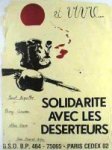
[ca 1982] |

[ 1982 ?] |
[Octubre 1934, la revolución de Asturias]
[Octubre 1934, la revolución de Asturias]. — [S.l.] : CNT_ (España), . — 1 affiche (impr. photoméc.), coul. (deux : rouge , noir ) ; x × y cm.
sources :
[Öfters mal blau-machen !]
[Öfters mal blau-machen !] / David Lusmore. — Berlin : FAU-IAA (Freie Arbeiter und Arbeiterinnen Union : Deutschland), . — 1 affiche (impr. photoméc.), coul. (deux : rouge , noir ) ; 59 × 21 cm.
sources :

[s.d.] |

[s.d.] |
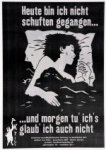
[ca 2000] |
[ohne Titel]
[ohne Titel]. — [S.l.] : [s.n.], . — 1 affiche (impr. photoméc.) : n. et b. ; x × y cm.
sources :
[One Big Union]
[One Big Union]. — Cleveland : IWW_ (Industrial workers of the World : 1905-....), . — 1 affiche (impr. photoméc.) : n. et b. ; 43 × 36 cm.
sources :
[Oproep 30 april massale demonstratie]
[Oproep 30 april massale demonstratie]. — Amsterdam : [s.n.], . — 1 affiche (impr. photoméc.) : n. et b. ; x × y cm.
sources :
[Oser tout changer]
[Oser tout changer]. — Paris : No Pasaran (réseau), . — 1 affiche (impr. photoméc.), coul. (deux : noir , magenta , papier blanc ) ; 70 × 50 cm.
sources :
[Otra reforma laboral contra los trabajadores y trabajadoras. Ahora nos toca mover !]
[Otra reforma laboral contra los trabajadores y trabajadoras. Ahora nos toca mover !]. — [S.l.] : CNT_ (España), . — 1 affiche (impr. photoméc.), coul. (deux : rouge , noir , papier blanc ) ; x × y cm.
sources :
[Otxoa artzain. Borroka armatua herri borroka da]
[Otxoa artzain. Borroka armatua herri borroka da]. — [S.l.] : [s.n.], . — 1 affiche (impr. photoméc.) : n. et b. ; 45 × 64 cm.
sources :
[Our transport hospital run on black + white]
[Our transport hospital run on black + white]. — [S.l.] : [s.n.], . — 1 affiche (sérigr. ) : n. et b. ; 42 × 33 cm.
sources :

[s.d.] |
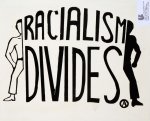
[s.d.] |
[Ouvrier, ouvrière du BTP, syndique toi]
[Ouvrier, ouvrière du BTP, syndique toi]. — Lyon : CNT_F (France) : SUB_ - CNT_ (Syndicat unique du bâtiment), . — 1 affiche (impr. photoméc.), coul. (deux : rouge , noir , papier blanc ) ; 60 × 84 cm.
sources :
[Pagherete Caro ! per una società senza galere e senza padroni !]
[Pagherete Caro ! per una società senza galere e senza padroni !]. — [S.l.] : [s.n.], . — 1 affiche (impr. photoméc.) : n. et b. ; x × y cm.
sources :
[Paghi chi non ha mai pagato… Protestiamo, organizziamo la protesta !]
[Paghi chi non ha mai pagato… Protestiamo, organizziamo la protesta !]. — Ragusa Raguse : Circolo 6 Gennaio 1945 (Ragusa), . — 1 affiche (impr. photoméc.), coul. (une : noir , papier de couleur ) ; 100 × 70 cm.
sources :
[Paix au Vietnam]
[Paix au Vietnam]. — Rouen : Groupes libertaires Normandie, . — 1 affiche (impr. photoméc.) : n. et b. ; diam 35 cm × 35 cm.
sources :
[Parliament - the longest running farce]
[Parliament - the longest running farce]. — London Londres : [s.n.], . — 1 affiche (impr. photoméc.) : n. et b. ; 31 × 45 cm.
sources :
[Pas de guerre entre les peuples ; pas de paix entre les classes]
[Pas de guerre entre les peuples ; pas de paix entre les classes]. — [S.l.] : CNT_F (France), . — 1 affiche (impr. photoméc.), coul. (deux : rouge , noir , papier blanc ) ; x × y cm.






